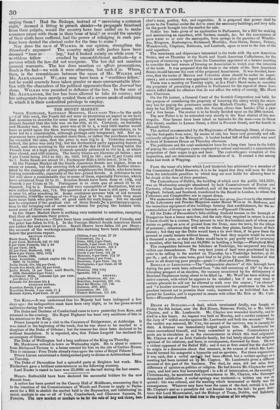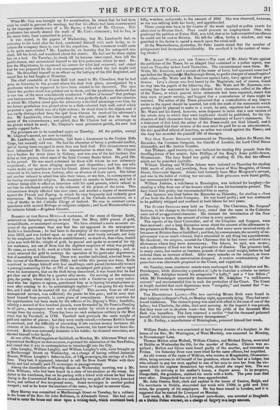DEATH BY DUELLING. — A duel, which terminated fatally, was fought on
Friday the 8th instant, near the Red House, Battersea Fields by- a Mr. Oliver Clayton, and a Mr. Lambrecht. Mr. Clayton was wounded mortally, and he died in a few hours. An inquest was held on Monday, and a verdict returned by the Jury of" wilful murder against Mr. Lambrecht and both the seconds." When the verdict was returned, Mr. Cox, the second of the survivor, was in custody for debt. A detainer was immediately lodged against him. Mr. Lambrecht has since surrendered himself, and been committed to prison. Contradictory re- ' ports are in circulation as to the circumstances in which this duel originated. Mr. Clayton was of an Irish Catholic family, but had lately abjured the religious opinions of his relations, and been in consequence, disowned by them. He WaS a violent opponent of the Relief Bill; and it was at first stated that the duel had its origin in a discussion about that measure, in the course of which Mr. Lam- brecht termed his antagonist a hypocrite and an apostate. For these expressions it was said, that a verbal apol9gy had been offered. but a written apology or a meeting had been insisted on by Mr. Clayton. Mr. Lambrecht gives a different account of this part of the business. The duel, he says, did not arise from difference of opinion on politics or religion. He had known Mr. Clayton for many years, and had seen him horsewhipped : in a fit of intoxication, on the evening of Christmas-day, he mentioned that circumstance to Mr. Clayton, who thereupon demanded satisfaction. A verbal apology was tendered—a written one was re- quired : this was refused, and the meeting which terminated so fatally was the consequence. Whatever may have been the cause of the duel, certain it is, that Mr. Clayton's zeal as a proselyte did not forsake him to the last : be gave direc- tions that Lord Monntcashel, and the Bishops of Tuam, Dublin, and Salisbury, should be informed that be died kw to tko opinions of his adoption.
When Mr. Cox was brought up fcr examination, he stated that he had done what he could to prevent the meeting, but that his efforts had been counteracted by the improper interference of a Mr. Byrne, a friend of Mr. Clayton. This gentleman has stoutly denied the truth of Mr. Cox's statement ; but he has, in the mean time, been committed to prison. It was stated, in the papers of Wednesday, that Mr. Lambrecht had, on returning to his hotel after the duel, conducted himself with such levity, as to induce the company there to vote for his expulsion. This statement would seem to be quite unwarranted.' Mr. Lambrecht, on learning that his antagonist was dead, left his hotel, and wandered about the streets. He had not for three nights. lain on a bed. On Tuesday, he drank till be became intoxicated, then left the public-house, and surrendered himself to the first policeman whom he met. Be- fore the Magistrates, he expressed his sorrow for what had occurred, and stated that he was prepared for the worst consequences with which the law might visit him. He described himself as an officer on the half-pay of the 43d Regiment, and stated that he had fought at Waterloo. The chief constable at Union Hall had stated to Mr. Chambers, that he had gone on Saturday to the ground where the duel took place, accompanied by a gentleman whom he supposed to have been related to the deceased, • The spot where the parties stood was pointed out to them, and the gentleman declared that it was one of the most scandalously conducted "affairs of honour" that perhaps ever had occurred. When the parties fired, it was perfectly dark ; and the situation in which Mr. Clayton stood gave his adversary a decided advantage over him, for the former gentleman was placed close to a dark-coloured high wall, out of which projected a spar, which was of a light colour ; he stood close to the object, and it was easily distinguished from the spot from whence he received his adversary's fire. Mr. Lambrecht, when interrogated on this point, stated that he was not aware of the circumstance; • and added, that Mr. Clayton had an advantage in the pistols which he used ; Mr. Clayton's were percussion pistols, his own had merely capped locks. The prisoners are to be examined again on Tuesday. All the parties, except Mr. Clayton's second, are now in custody. Mr. Lambrecht, or Lambreachte, had been a Lieutenant in the Ceylon Rifle Corps, but recently sold out. He had the character of being a professed duellist, and of having been engaged in more than one fatal duel. This circumstance may have influenced Mr. Clayton in his determination to meet him. Mr. Clayton was a banker for seven years in Galway, and was one of the last bankers that failed at that period, when most of the Irish Country Banks failed. He paid 20s. in the pound. He was much esteemed by those with whom he was intimately acquainted ; of the most obliging manner and disposition ; and was one who would make any sacrifice to serve his friend. About two years back Mr. Clayton returned to his native town, Galway, after an absence of seven years. His father and mother refused to admit him into their house, or see him, in consequence of his having changed his religion. He remained six months in Galway, and left it without being able to effect an interview with his aged parents, whose refusal to see him he attributed entirely to the influence of the priests of the town. This circumstance deeply affected him ever since, and excited a degree of resentment against the Priests and Popery, to which he very frequently and violently gave expression. Mr. Clayton opposed O'Connell at the Catholic Association, on a vote of thanks to the Catholic Clergy of Ireland. He was in constant corre- spondence with several Bishops on religious subjects ; and Lord Mountcashel was his intimate friend.—Brighton Gazette.



















 Previous page
Previous page